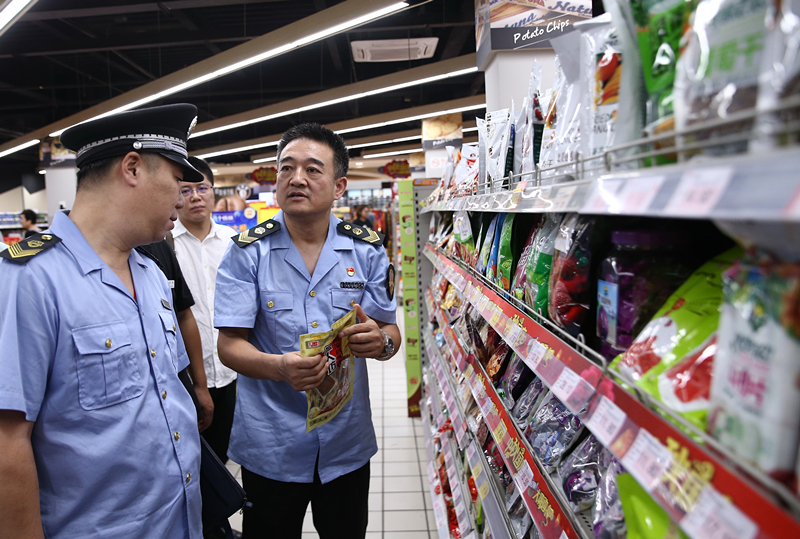China has uncovered about 78,000 food safety violations since June in a crackdown on the illicit use of food additives and the sale of counterfeit or substandard food products, the State Administration for Market Regulation said on Friday.

Police inspectors check the food quality at a supermarket in Beijing's Xicheng district on June 26, 2019. (Photo: China Daily)
The crackdown has resulted in fines totaling 910 million yuan ($130 million) and suspensions of more than 2,400 manufacturers, said Yang Hongcan, head of the administration's law enforcement bureau.
"We have targeted pressing issues that the public has complained about most in the food safety sector, including food containing excessive amounts of additives or inedible substances, and meat products that have failed inspection tests," he said.
The campaign is jointly led by the administration and the Ministry of Public Security with support from 12 other government bodies.
In one case revealed on Friday, three farmers in Gansu province's Jinchang city in July were found to have spread a prohibited and highly poisonous pesticide, known as Thimet, to farmland growing onions. The local public security authority has now taken over the case.
Li Jiantao, deputy director of the ministry's bureau that tackles food and drug-related crimes, said during the campaign that intense surveillance has been paid to health supplements, meat and dairy products as well as the use of pesticides and veterinary drugs.
"These sectors have seen rampant offenses and sparked widespread revulsion from the public," he said. The bureau was set up in May to step up the country's measures to stem the tide of fake or hazardous products.
He added that local public security authorities have cracked more than 8,700 cases and arrested 16,000 suspects during the campaign.
In the meantime, training and advocacy programs intended to promote the safe use of pesticides and veterinary and fish antibiotics have also been offered to farmers in key vegetable-producing areas and other rural regions in China, according to Huang Xiuzhu, an official with the Ministry of Agriculture and Rural Affairs.
As of late last week, nearly 950 metric tons of problematic agricultural products and drugs had been destroyed.
"We aim to foster an environment that shows zero tolerance for safety issues involving agricultural products," he added.
The crackdown was prompted by an education campaign on the theme of "staying true to our founding mission" that was launched throughout the Communist Party of China Central Committee in June.
Yang, from the State Administration for Market Regulation, said the joint mission will maintain its "highhanded posture" to crack down on crimes.
In the past, China was rocked by a slew of food safety scandals involving dangerous baby formula and "gutter oil"-recycled cooking oil from kitchen waste-but it has since ramped up supervision over the industry, pledging to slap the strictest punishment on violators.
On Monday, a regulation based on the revised Food Safety Law, which was adopted in 2015, took effect. The regulation was released by the State Council in October.
The new regulation looks to intensify supervision that covers the entire spectrum of the food sector and effectively deter violations by handing out harsher penalties to individual offenders.


